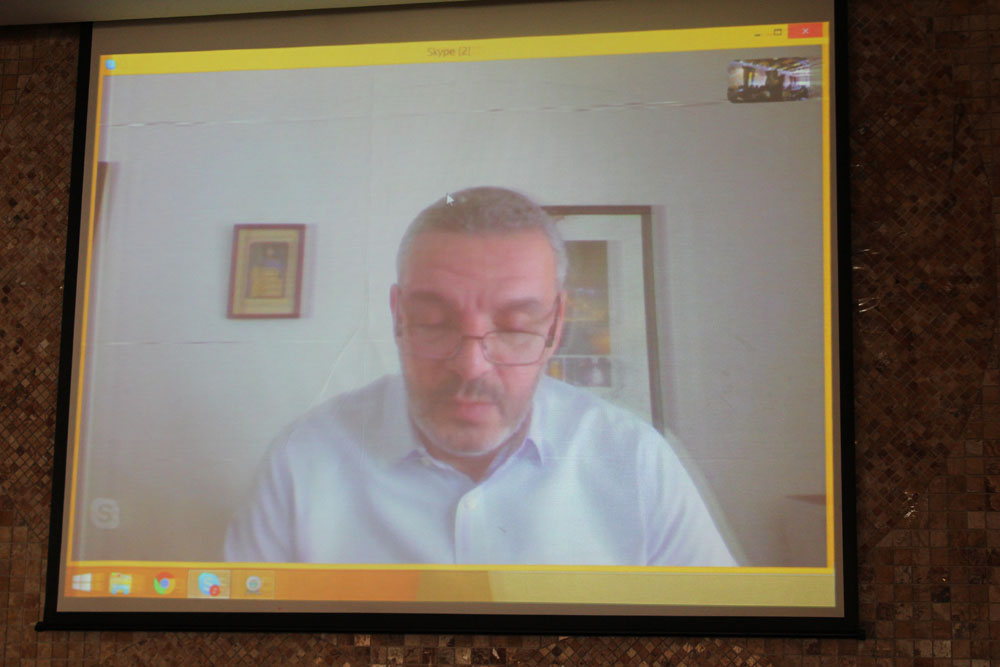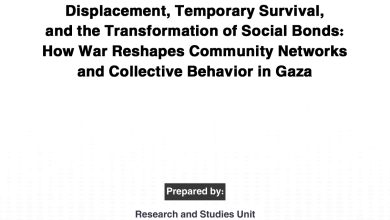The US Policy towards Palestine over a Hundred Years with Mr. Khaled Elgindy

Monday, May 20, 2019
The roundtable entitled ‘The US policy towards Palestine over a Hundred Years’ implemented in partnership with Friedrich-Ebert-Stiftung within the project “Keeping the Palestinian Cause Alive on the Regional and International Political Agendas.” The session took place at the Light-House restaurant, Gaza City. The Guest Speaker is Mr. Khaled Elgindy, author of the newly published book “Blind Spot: America and the Palestinians, from Balfour to Trump.”
Mr. Omar Shaban, director of Pal-Think, welcomed the attendees and noted that despite all challenges imposed on Gaza, Pal-Think for Strategic Studies as an independent organization continue to foster dialogue and to keep in touch with the international community, which connect people in Palestine with the rest of the world.
Dr. Usama Antar, the Programme Manager at the FES branch office in the Gaza Strip, noted the importance of the session’s topic, he also pointed out the importance of this partnership with Pal-Think on the project, referring to the roundtable discussion as a very effective method in promoting awareness through dialogue and constructive debate. There is a lack of understanding for the position of the international community, and it is essential to have such conversations, which can lead to better support the international-Palestinian relations and decision-making processes. In fact, Palestinians need to understand the dynamics of American foreign politics, especially now with the deal of the century.
Mr. Khaled Elgindy is a nonresident fellow in the Center for Middle East Policy at Brookings and a founding board member of the Egyptian American Rule of Law Association. He previously served as an advisor to the Palestinian leadership in Ramallah on permanent status negotiations with Israel from 2004 to 2009.
The blind spot is about two specific areas where American policymakers have trouble to see or consider:
- Israeli power: since Belfour American policymakers have always viewed the Palestinian issue through the Zionist lens, American politicians tend to be blind about the negatives of Israeli power. There is much sensitivity when it comes to Israeli politics, e.g., talking about issues like Jerusalem; negotiations were exclusively dominated and influenced by the Israeli power.
- Palestinian politics: on the other hand, American policymakers have always had zero sensitivity when it comes to negotiations with the Palestinians, U.S policymakers have no trouble talking about issues related to the Palestinians
In fact, in meditation it is vital to be aware and consider the balance of power for two parties in the negotiation, a mediator must differentiate between those powers and this balance of power matters for the mediating party to be effective. However, the case for American politicians, they have been blind to this reality since they have always treated the two sides as equal powers. The U.S has not been able to challenge the occupation, but done everything around it, where Israel has more power, and Palestinian is the weaker side. This reality is a product of America’s own politics and power and its unique relationship with and support to Israel.
The peace process has failed for two primary assumed reasons:
First: Israel has to make sure that every American president provides Israel with reassurances. It is essential to preserve Israel’s security. This result in not putting pressure on the strong party. By not putting pressure on Israel, it means always to ensure that Israel is reassured, with Israel not caring about making peace and continue the occupation by building new settlements on Palestinian land.
Second: Palestinians are the party that has to give concessions, so U.S politicians put much pressure on the weak party. This is based on the idea that Palestinian politics can be reformed to meet the needs of the peace process and fit in the international community, but not the interests of the Palestinian people themselves.
The result is maintaining the status quo and weakening the Palestinian leadership. This is the complete opposite of any logical mediation process all about. In many ways, the peace process did the opposite of what it was intended to do; it only led to a weaker Palestinian leadership, strengthened political divide between Gaza and the West Bank.
The “why” behind looking at the American interaction with the Palestinian issue from Belfour’s time not from Oslo or 67. Simply put, because the same reality of U.S position towards the Palestinian issue existed and has never changed since the time of Belfour. That’s for several reasons including:
First: The influential Zionist lobby.
Second: The sympathetic U.S Congress with Israel.
Third: Most importantly, the conflicted and divided executive branch, where during the British mandate and Belfour’s declaration, the US was neutral and silent. In fact, president Harry S. Truman was the first to recognize Israel as an independent state, even though there was no consensus among members of the three branches of the U.S administration. There was a divide among the members of the U.S administration, for instance, the road map was authored by the Bush administration, and at the same time, the Bush’s administration was the one that killed the road map. Different U.S administrations have one perspective and the opposite of it at the very same time.
In fact, every American president has in one way or another opposed the Israeli settlements, but at the same time, every administration has allowed and supported Israel with funds to continue the occupation and build more settlements on Palestinian land.
It is being said, a peace process that is full of contradictions will never succeed. Trump did not kill the peace process; it was dead since the Obama’s administration, Trump just wanted to rewrite the rules of the peace process in a way the fits to the current realities of the political game, whilst past American presidents concentrated efforts to maintain the status quo.
Trump now is only trying to recreate the peace process with some cosmetic reforms related to economic issues. Trump has taken the peace process beyond the 67, and this is the reason for the book “Blind Spot: America and the Palestinians, from Balfour to Trump.”
Now Trump is dealing with the Palestinian case same as America dealt with it before 1967, for Trump it is just a security and humanitarian issue with Gaza and an economic issue with the West Bank. It is not a political issue or an occupation that need to be ended.
Last but not least, the peace process was already dead even before Trump, Trump admin is far from reality and has zero odds of success unless the current administration adopts an approach that takes reality in consideration.
Contributions:
- The influence of Pro-Israel Evangelical Christians on the American foreign policy: Christian Zionism plays an essential factor, the reason for the blind spot comes from political, ideological, and cultural factors, Belfour himself was a Christian Zionist who believed in Jews’ right to return to the Holy Land and the establish the state of Israel in 1948. Belfour talked about the Palestinian issue with protestant lens; All American politicians always look at the issue this way since America is a protestant country in the first place. In 1922, the U.S Congress held a hearing about the Belfour declaration with two Palestinians testified, the questions that they were asked were about the Bible: The Bible was a history for the Congress, and according to the Bible, the original people of this land are the Judeo-Christians, not the Muslims. So, we cannot ignore cultural forces when we talk about Palestine.
- The ambivalent U.S administration. The relation between Trump and U.S policies: basically, there are two forces in the U.S, first is the Department of State and second is U.S Intelligence Community. Support for Zionism was always opposed by both forces. However, on the other side, the president who is heavily influenced by domestic politics influences that. There is this tension between these forces, a conflict inside the administration, especially inside the Republican one. That’s why American foreign policy is not connected or controlled only by or to the president, because the president must consider the views of the Congress since it is the branch the sets the budget and provides money. President Obama was sympathetic with the Palestinians but achieved less as he opposed the Congress. One of the main spoilers of the peace process is Congress itself. However, any president always tries to keep balance with other forces of the American political system.
- Mr. Khaled’s opinion on and advice for the Palestinian leadership: I am a critic of the Palestinian leadership; I believe it was a strategic mistake of the Palestinian leadership to exclusively count on the U.S as the leader for peacemaking process. The advice today is to forget about other Arab countries, the U.S, and Europe. It necessary for the current Palestinian leadership to fix its own house first and build a credible leadership with consensus, making a change from within, regardless of other political programs, for the common interest of all Palestinians.
- Will Trump be able to impose a peace plan on the Palestinians? Yes, he can, and he is doing so. It is already being implemented by Israeli and American unilateral planning. A deal or not, it does not matter; it is the same reality.



















